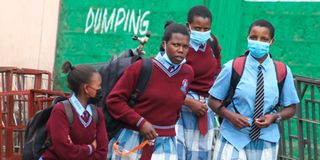Primary schools won’t host junior secondary, says PS

Students pass along the streets of Elburgon town, Nakuru County on their way home for the mid-term break in this photo taken on November 18, 2021.
What you need to know:
- Secondary schools are required to prepare to offer more than two pathways for learners ahead of the rollout of senior secondary school in 2026.
- According to the task force report, learners in junior secondary school will be exposed to broad-based curriculum content.
The government is racing against time to prepare for the transition from primary to junior secondary school in January 2023 under the competency-based curriculum (CBC).
This even as the principal secretary for Implementation of Curriculum Reforms, Prof Fatuma Chege, clarified that primary schools will not host junior secondary students.
Secondary schools are also required to prepare to offer more than two pathways for learners ahead of the rollout of senior secondary school in 2026, said Prof Chege.
“All secondary schools registered by the Ministry of Education must host junior secondary school. There is no secondary school that will be hosted by primary schools,” she said.
There has been uncertainty over the domiciling of the junior secondary school in some schools as recommended by a task force on the implementation of CBC that Prof Chege chaired.
A report by the task force recommends that provision be made for primary schools that have adequate infrastructure to establish junior secondary school.
It also recommends that the ministry merge primary schools that are under-enrolled and in close proximity.
Improving infrastructure
The infrastructure in one of them will be improved to create a junior secondary school. The ministry will develop a framework to facilitate the sharing and management of infrastructure for primary and secondary schools established in the same compound.
“If a primary school has extra infrastructure that can be transformed to host the junior secondary school, then it will be the responsibility of the ministry to establish a wing in those schools,” Prof Chege on Wednesday.
The PS said the ministry has mapped all secondary schools, is progressively improving infrastructure and will provide the necessary requirements for the rollout of the CBC.
According to the task force report, learners in junior secondary school will be exposed to broad-based curriculum content intended “to form the basis for effective identification of career paths, talents and interests in preparation for transition to senior school”.
It recommended progressive expansion of capacities of existing secondary schools that have adequate land to accommodate more learners in 2023. There are 10,359 secondary schools in the country, 9,039 of which are public, 1,285 private and 35 for special needs education learners.
The PS was speaking at the Kenya Institute of Special Education (KISE) in Kasarani, Nairobi, during the opening of the third national conference on special needs education.
The theme of the conference is ‘Functional assessment: Enhancing access to quality services for every child and youth’. It has brought together stakeholders and researchers in the sector. It began on Wednesday and will end on Thursday.
Offer three pathways
Prof Chege said learners in junior secondary schools will be exposed to a broad curriculum to enable them to explore their abilities and potential.
In senior secondary schools, students will be required to take three pathways: arts and sports science; social sciences; and science, technology, engineering and mathematics (Stem).
“Students with interest in taking more than two pathways will also be given the opportunity to pursue their dreams,” she said.
“Review the secondary education placement guidelines to provide clear criteria, including the use of assessments for placement of learners in junior secondary school,” reads the report.
The ministry will establish multiagency national, county and sub-county committees for effective transition. Given the primary school cycle will be reduced to six years, it is engaging the counties to work with the schools to ensure they utilise the empty classrooms that will be vacated for early childhood and development education learners, Prof Chege said.
The PS said the county governments and other leaders will be required to work with the ministry to make it possible for the schools in their regions to offer the three pathways in senior secondary schools. She also noted the need to have inclusive education for children with special needs as the government continues to roll out the CBC.
Education Cabinet Secretary George Magoha, in a speech read by the PS, said the government was committed to promoting the education for all children, especially those with special needs and disabilities.





